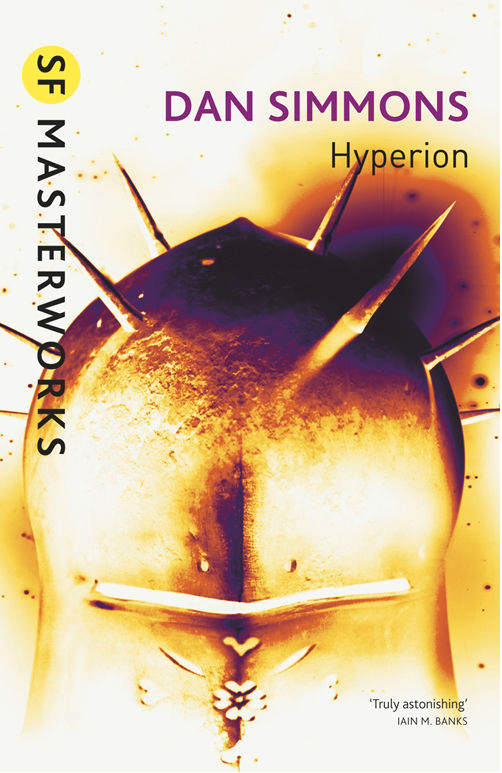Book review: Hyperion by Dan Simmons

HYPERION
By Dan Simmons
Hyperion is one of those books that has been on my to-read list forever. I’m now an Audible subscriber, so I took the opportunity to listen to the audiobook while hiking the Tour of Monte Rosa in September 2015. Is this classic work of science fiction worth your time? Here’s my review.
At its best, I believe that science fiction should ask more questions than it answers. The purpose of SF is not to tell us what the future will look like; its purpose is to enchant us with possibilities, make us think about our purpose in the universe, and warp our preconceived notions of how things are. Hyperion asks many questions but provides very few answers. Who or what is the terrifying Shrike? And the Time Tombs, mysterious structures moving backwards in time, associated with the Shrike but understood by nobody – what do they signify? Will the planet Hyperion fall under the assault of the Ouster battle fleet? Is Martin Silenus really hundreds of years old, born on Old Earth before the Hegira? Will the pilgrims making their way towards the Valley of the Time Tombs obtain what they desire, or will they end up impaled for eternity on the thorns of the Shrike’s metal tree?
The story resonates with symbolism and enchantment. The structure – that of a frame story – is inspired by Chaucer’s Canterbury Tales, and skilfully brings each of the pilgrims to life. They’re all great characters, richly developed with their own tragic histories that, one by one, compel them to seek out the Shrike in the hope their wishes can be granted. The 19th century poet John Keats is another theme that resonates throughout the novel (one of the characters is even an AI-based ‘cybrid’ entity modelled on the persona of Keats). The enigma of the Shrike and the Time Tombs provides a compelling undertone of mystery.
In many ways, Hyperion is fantasy rather than science fiction. I was strongly reminded of the work of Robert Holdstock – in particular Mythago Wood, which is similarly vibrant with mythology and unanswered questions.
The science fiction aspects of this book were less original and trod the well-worn path of a galactic human civilisation linked by starships and ‘farcaster’ portals enabling instant travel between distant points. There’s also a nebulous outside threat (the ‘Ousters’, who seek to invade Hyperion and defeat the Hegemony of Man). The traditional sci-fi elements didn’t impress me anywhere near as much as the mythological themes, but actually I think the sci-fi background is almost unimportant and merely provides a backdrop to the true story.
Time is another recurring theme. The Shrike is a fearsome demonic entity sent from the distant future to wreak havoc, and the Time Tombs are travelling backwards in time and surrounded by anti-entropic fields. One of the characters, Rachel Weintraub, contracts a temporal disease while studying the Time Tombs and begins to age in reverse. A subterranean Christian cathedral is discovered on Hyperion that appears to be 750,000 years old (this subplot had very little ‘screen time’ but was compelling). The time debt accrued during FTL interstellar travel creates some interesting plot twists too. These themes are not particularly original, but in combination with the sense of mystery and wonder woven throughout the book you have a winning combination.
The book ends on a cliffhanger. As I read other reviews I see that other readers didn’t like that, but for me it felt like a natural ending – albeit one that immediately prompted me to buy all the sequels.
I’m normally the sort of reader who reads a book and either likes it or doesn’t, then moves on to something else, rarely thinking too much about what I’ve just read. But I can’t seem to stop thinking about the extraordinary events and questions in Hyperion. Elements of the story drift to the forefront of my thoughts at random times, and I find myself analysing and re-analysing interpretations of the mysteries, trying to figure out what’s going on. I suspect that the symbolism goes even deeper than I can see.
In short, it’s an incredible work of fantasy/science fiction, and I’m already enjoying the sequel, The Fall of Hyperion. If you like this kind of book then Hyperion is a must-read.
Alex Roddie Newsletter
Join the newsletter to receive the latest updates in your inbox.



